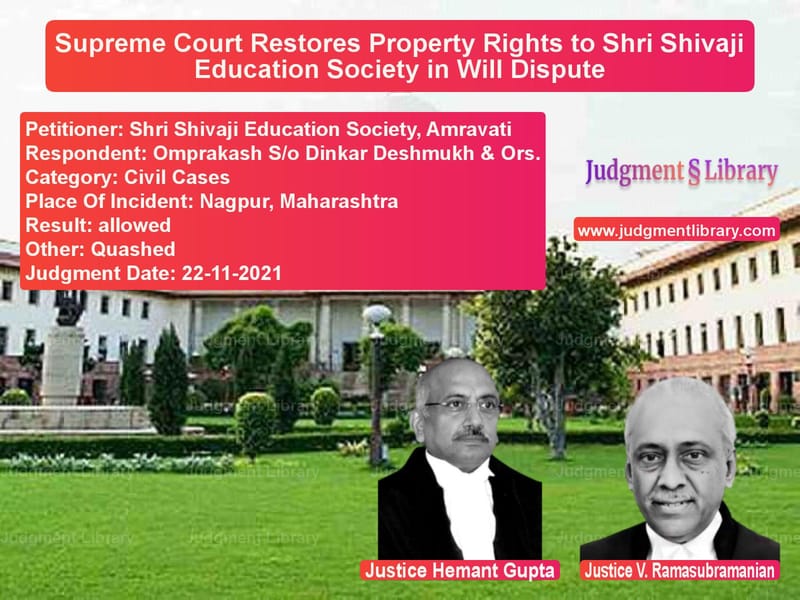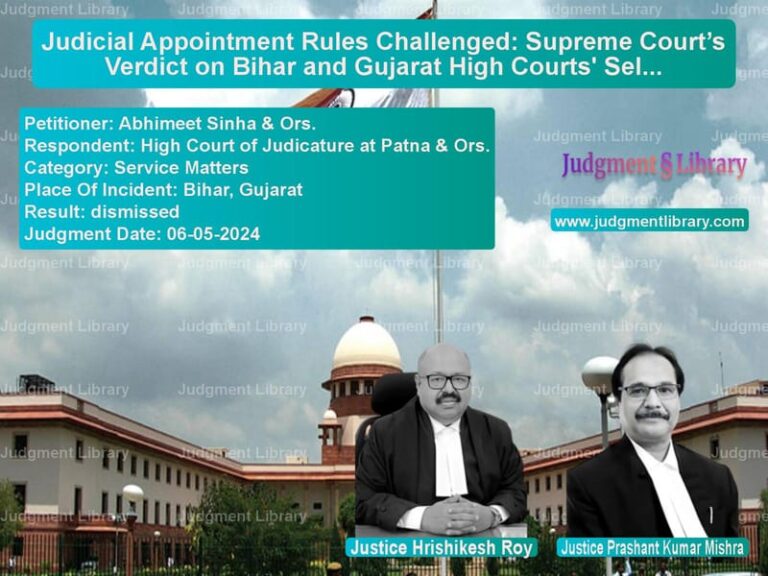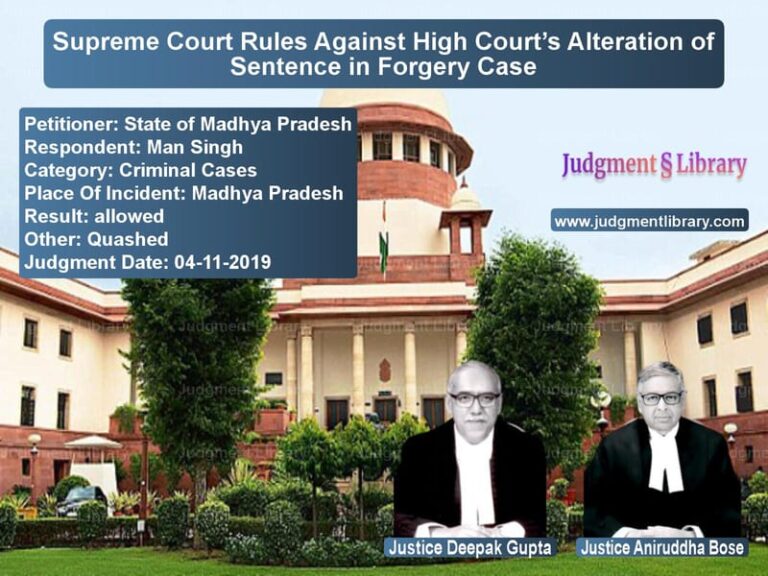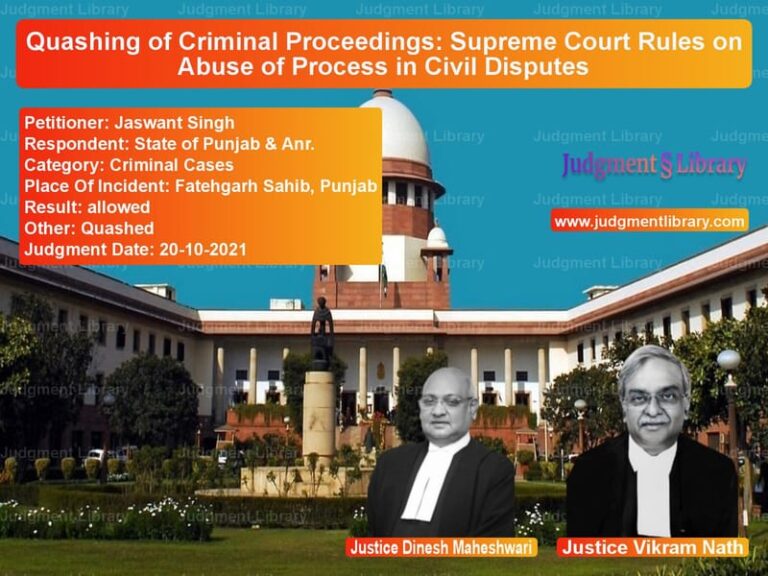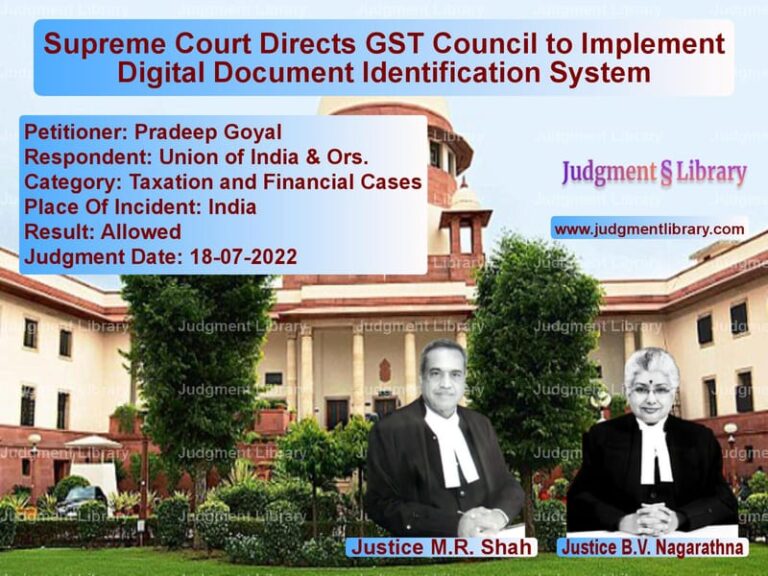Supreme Court Restores Property Rights to Shri Shivaji Education Society in Will Dispute
The Supreme Court of India, in its judgment dated 22 November 2021, ruled in favor of Shri Shivaji Education Society, Amravati, restoring its property rights over a disputed house. The case, Shri Shivaji Education Society vs. Omprakash S/o Dinkar Deshmukh & Ors., involved a decades-long legal battle concerning the validity of a gift deed executed by Smt. Shevantabai, the widow of the original property owner.
Background of the Case
The dispute centered around a house originally owned by Shri Kashirao Sampatrao Deshmukh, who passed away on 1 May 1977. After his death, his widow, Smt. Shevantabai, executed a registered gift deed on 9 April 1981 in favor of Shri Shivaji Education Society. However, the defendants, who had been residing in the property, claimed possession based on a will allegedly executed by the late Kashirao Deshmukh on 4 May 1976.
The gift deed led to a civil suit (Regular C.S. No. 24 of 1982) filed by Shri Shivaji Education Society along with Smt. Shevantabai, seeking possession of the property. The defendants contested the claim, arguing that under the will, Shevantabai only had a life estate, and after her demise, the property was to devolve upon the first defendant.
Trial Court’s Decision
The trial court, in its judgment dated 17 December 1986, ruled in favor of the defendants, holding that:
- The will dated 4 May 1976 was valid.
- Shevantabai had only a limited right of enjoyment during her lifetime.
- The gift deed executed by Shevantabai in favor of Shri Shivaji Education Society was invalid.
However, the court granted Shevantabai possession of the property during her lifetime.
First Appellate Court’s Ruling
Aggrieved by the trial court’s decision, Shri Shivaji Education Society filed an appeal (R.C.A No. 416 of 1986), arguing that the will granted Shevantabai absolute ownership, allowing her to transfer the property. The Additional District Judge, Akola, in a judgment dated 22 January 1992, ruled in favor of the education society, concluding that:
- The will’s recitals indicated Shevantabai had full rights of enjoyment, including disposal of the property.
- Shevantabai was the absolute owner and had the right to execute a gift deed.
- The trial court had erred in interpreting the nature of the bequest.
High Court’s Reversal
The defendants then filed a second appeal (S.A. No. 154 of 1992) before the Bombay High Court, Nagpur Bench. The High Court, in its judgment dated 14 October 2014, reversed the first appellate court’s decision, ruling that:
Read also: https://judgmentlibrary.com/land-ownership-dispute-supreme-court-overrules-lower-court-decisions/
- Shevantabai only had a life estate under the will.
- The property could not have been transferred to Shri Shivaji Education Society.
- Her estate did not enlarge under Section 14(1) of the Hindu Succession Act, 1956.
Supreme Court’s Observations
The Supreme Court bench, comprising Hemant Gupta and V. Ramasubramanian, examined the legality of the High Court’s ruling and observed:
- The first appellate court had correctly interpreted the will, which explicitly stated that “after her death, whatever property remains shall go to my nephew.”
- The phrase “whatever property remains” indicated that Shevantabai had full ownership, including the right to dispose of the property.
- The High Court had overstepped its jurisdiction under Section 100 of the Civil Procedure Code by interfering with the first appellate court’s findings.
- The High Court misapplied the Hindu Succession Act, which was not relevant to the issue at hand.
Key Supreme Court Rulings Cited
The Court referred to several precedents, including:
- Bhanwarlal vs. Mandal Revenue Officer (1996) – Emphasizing that recitals in a will must be interpreted based on their natural meaning.
- Kariyappa vs. Rangamma (2010) – Holding that a life estate must be explicitly mentioned to be treated as such.
- Sadhu Singh vs. Gurudwara Sahib Narike (2006) – Clarifying the distinction between limited and absolute ownership.
Final Judgment
The Supreme Court ruled in favor of Shri Shivaji Education Society and issued the following directives:
- The judgment of the Bombay High Court, Nagpur Bench, dated 14 October 2014, was set aside.
- The decision of the first appellate court, which had upheld the gift deed in favor of Shri Shivaji Education Society, was restored.
- The suit filed by the education society was decreed, granting them possession of the property.
- No costs were imposed on either party.
Implications of the Judgment
This ruling has significant implications for property disputes and succession laws in India:
- Reinforcement of Testamentary Intent: The judgment underscores the need to interpret wills based on their explicit wording.
- Protection of Gift Deeds: The ruling confirms that a life estate must be clearly stated in a will; otherwise, the beneficiary has full ownership rights.
- Limits on High Court Interference: The decision reaffirms that High Courts must not re-evaluate factual findings of lower courts unless they are perverse.
- Legal Clarity on Life Estates vs. Absolute Ownership: The ruling provides clear guidelines on how to distinguish between a life estate and absolute ownership.
The Supreme Court’s judgment in Shri Shivaji Education Society vs. Omprakash S/o Dinkar Deshmukh & Ors. sets a precedent for similar cases, ensuring that the original intent of testators is upheld and legally recognized.
Petitioner Name: Shri Shivaji Education Society, Amravati.Respondent Name: Omprakash S/o Dinkar Deshmukh & Ors..Judgment By: Justice Hemant Gupta, Justice V. Ramasubramanian.Place Of Incident: Nagpur, Maharashtra.Judgment Date: 22-11-2021.
Don’t miss out on the full details! Download the complete judgment in PDF format below and gain valuable insights instantly!
Download Judgment: shri-shivaji-educati-vs-omprakash-so-dinkar-supreme-court-of-india-judgment-dated-22-11-2021.pdf
Directly Download Judgment: Directly download this Judgment
See all petitions in Property Disputes
See all petitions in Succession and Wills
See all petitions in Judgment by Hemant Gupta
See all petitions in Judgment by V. Ramasubramanian
See all petitions in allowed
See all petitions in Quashed
See all petitions in supreme court of India judgments November 2021
See all petitions in 2021 judgments
See all posts in Civil Cases Category
See all allowed petitions in Civil Cases Category
See all Dismissed petitions in Civil Cases Category
See all partially allowed petitions in Civil Cases Category

